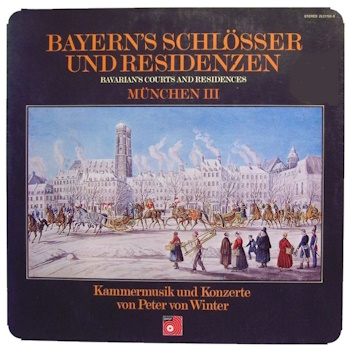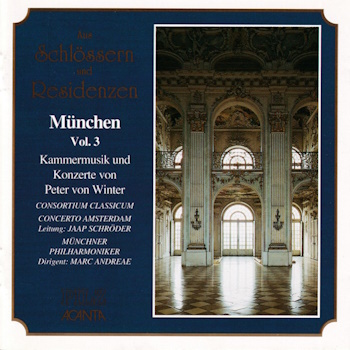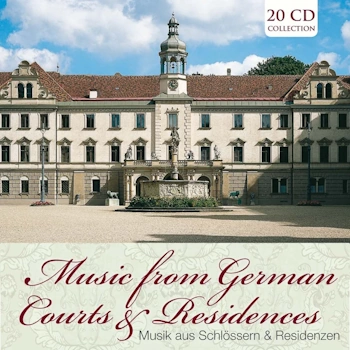 |
|
2 LPs
- 29 21190-8 - (p) 1972
|
 |
| 2 CDs -
44 2157-2 - (c) 1993 |
|
MÜNCHEN
III
|
|
|
|
|
|
|
|
| Peter von
WINTER (1754-1825) |
Sinfonia
concertante B-Dur für Violine,
Viola, Oboe, Klarinette, Fagott,
Violoncello und Orchester, Op. 20
|
LP 1 |
|
18' 34" |
|
|
-
Allegro
|
|
10' 56" |
|
A1 |
|
-
Rondo: Allegro
|
|
7' 35" |
|
A2 |
|
(Münchner
Philharmoniker)
|
|
|
|
|
| Peter von WINTER |
Sinfonia
concertante B-dur für Violine,
Klarinette, Horn, Fagott und
Orchester |
LP 1 |
|
19' 37" |
|
|
-
(Allegro)
|
|
8' 51" |
|
A3 |
|
-
(Andante · Thema und Variationen) |
|
4' 15" |
|
A4 |
|
-
Rondo |
|
6' 26" |
|
A5 |
|
(Concerto
Amsterdam)
|
|
|
|
|
| Peter von WINTER |
Septett
Es-Dur für 2 Violinen, Viola,
Violoncello, Klarinette und 2
Hörner, Op. 10 |
LP 2 |
|
23' 37" |
|
|
-
Allegro moderato
|
|
8' 21" |
|
B1 |
|
-
Adagio
|
|
4' 34" |
|
B2 |
|
-
Menuetto: Allegro
|
|
3' 31" |
|
B3 |
|
-
Rondo: Moderato |
|
7' 04" |
|
B4 |
|
(Consortium
Classicum)
|
|
|
|
|
| Peter
von WINTER |
Oktett
Es-Dur für Violine, Viola,
Violoncello, Flöte, Klarinette,
Fagott und 2 Hörner |
LP 2 |
|
17' 14" |
|
|
-
Allegro |
|
7' 03" |
|
B5 |
|
-
(ohne Satzbezeichnung)
|
|
2' 53" |
|
B6 |
|
-
(ohne
Satzbezeichnung) |
|
7' 16" |
|
B7 |
|
(Consortium
Classicum) |
|
|
|
|
|
|
|
|
| Sinfonia
concertante B-Dur. Op. 20 |
Sinfonia
concertante B-Dur |
Septett
Es-Dur, Op. 10
|
Oktett
Es-Dur |
|
|
|
|
MÜNCHNER
PHILHARMONIKER
|
CONCERTO
AMSTERDAM |
CONSORTIUM
CLASSICUM
|
CONSORTIUM
CLASSICUM |
| - Rainer Kussmaul, Violine |
- Jaap Schröder, Violine |
- Rainer Kussmaul, Violine |
- Rainer Kussmaul, Violine |
| - Jürgen Kussmaul, Viola |
- Dieter Klöcker, Klarinette |
- Jacques Holtman, 2.
Violine |
- Jürgen Kussmaul, Viola |
| - Gernot Schmalfuß,
Oboe |
- Werner Meyendorf,
Horn |
- Jürgen Kussmaul, Viola |
- Anner Bylsma, Violoncello |
| - Dieter Klöcker, Klarinette |
- Karl- Otto
Hartmann, Fagott |
- Anner Bylsma, Violoncello
|
- Frans Vester, Flöte |
| - Karl- Otto
Hartmann, Fagott |
Jaap SCHRÖDER,
Leitung |
- Dieter Klöcker, Klarinette
|
- Dieter Klöcker, Klarinette |
| - Anner Bylsma, Violoncello
|
|
- Werner Meyendorf,
Horn |
- Karl- Otto
Hartmann, Fagott |
| Marc ANDREAE,
Dirigent |
|
- Nikolaus Grüger, Horn
|
- Werner Meyendorf,
Horn |
|
|
|
- Nikolaus Grüger, Horn |
|
|
|
|
Recorded
at: |
|
-
|
|
|
Live / Studio
|
|
Studio |
|
|
Producer |
|
-
|
|
|
Balance engineer
|
|
-
|
|
|
First LP Edition
|
|
BASF
| 29 21190-8 | 2 LPs | durata
38' 11" - 40' 51" | (p)
1972
|
|
|
First CD Edition |
|
PILZ
- ACANTA | 44 2157-2 | 2 CDs |
durata 38' 11" - 40' 51" | (c)
1993 | ADD
|
|
|
Note |
|
-
|
|
|
|
|
Musik
aus Schlössernb &
Residenzen
(20 CD Collection)

Membran |
234355 | (c) 2016
(in CD 17
& 18)
|
Peter
von Winter was born in Mannheim
on August 28th, 1754. The son of
a brigadier, he was taken into
the service of Elector Karl
Theodor at the early age of ten
to play in the Mannheim court
orchestra, and so was fortunate
enough to experience in its
prime the „Mannheim school“, by
then famous throughout Europe.
The writer Schubart sang the
praises of the Mannheim
orchestra: „Its forte is like
thunder, its crescendo a
cataract, its diminuendo a
crystal stream rippling away
into the distance, its piano a
breath of spring. The wind
instruments are all employed the
way they should be employed:
they elevate and carry or enrich
and animate the musical flow of
the violins.“ Here Winter
received a sound musical
training, and by the age of
fifteen had learned to play the
double-bass, later taking up the
violin as his main instrument.
When in 1778 the Elector
succeeded to the Bavarian
throne, most of the Mannheim
orchestra, including Winter,
moved to Munich the new capital.
At Mannheim under the guidance
of Abbe Georg Joseph Vogler
Winter had already shown himself
to be a capable composer. Now in
Munich he began to distinguish
himself in this field, his
ballet music and concertos being
most favourably received. The
year 1782 saw the first of his
numerous operas and Singspiele:
„Helena und Paris“. The most
successful of these however was
„Das unterbrochene Opferfest“,
written in 1796. This highly
effective „heroic opera“ had its
premiere in Vienna and made
Winter internationally famous
overnight. It was followed by
his heroic-comic opera, „Das
Labyrinth oder der Kampf mit den
Elementen“ („The Labyrinth or
The Fight against the
Elements“), a sequel to Mozart’s
„Magic Flute“ and partly based
on it. In 1787 Winter had been
appointed deputy-leader of the
Munich Court Orchestra and in
1798 he was made principal
choral conductor. Up to 1805 he
travelled extensively, visiting
Naples, Venice, Berlin, Prague,
Warsaw, Petersburg, Moscow,
Stockholm and London. Although
during this period most of his
compositions were in the field
of opera, he by no means
neglected instrumental music,
which was equally dear to his
heart. On February 29th, 1804,
he conducted the first
performance of his Sinfonia
Concertante for six solo
instruments and orchestra at the
Redoutensaal in Munich. From
then until 1816 his name
frequently appears in the
programmes of the winter series
of subscription concerts given
by the court orchestra. Known
after 1811 as the „Musical
Academy“, this was an
institution that formed an
integral part of musical life in
Munich and still enjoys a high
reputation today. Chamber music
compositions too, such as his
Septet, published in Paris in
1803, were often performed.
Winter’s greatest triumph on the
concert platform, however, was
his Battle Symphony for five
orchestras and choirs, performed
on April 18th, 1814, at the
Cuvillié Theatre in Munich.
On March 23rd, 1814, the court
celebrated Winter’s 50 years of
service there with a grand
anniversary concert consisting
of a selection of works he had
composed in Munich over four
decades. He was awarded the
Order of Merit by King Max
Joseph of Bavaria, an honour
carrying with it a title – he
was now known as Ritter Peter
von Winter. In the years that
followed he devoted himself
mainly to the composition of
church music and enjoyed high
esteem as a teacher of voice and
composition. Many distinguished
Munich composers owed their
training to him.
Not all the works in his wide
range of compositions are of the
same high standard, but many
bear witness to his remarkable
ingenuity, and his command of
both form and media. Some traits
in his music seem to anticipate
the Romantic Movement, but on
the whole the Classical element
prevails. What a contemporary
said of his operas may also be
applied to the rest of his work:
„He possesses neither that fire,
that brilliant turbulence that
flares up in Jomelli from time
to time, enthralling the
listener within the space of a
few bars, nor the temperament of
a Paisiello. Rather he appears
adept and ordered, clothed more
with the classical elegance of a
French tragedian than with the
trappings of a British tragic
actor. His music has always had
ready appeal and provided us
with pleasent diversion.
We can gain some idea of what
Winter was like as a person from
the letters of Carl Maria von
Weber and the memoirs of Ludwig
Emil Grimm, the painter, and
Ludwig Spohr, the composer all
of whom often come into close
contact with the all powerful
Kapellmeister. Spohr writes of a
visit to Munich in 1807: „I was
often with Winter, taking a
delight in his rather eccentric
person, which was remarkably
paradoxical. Winter, a man of
huge stature, with the strength
of a colossus, was nevertheless
as timid as a rabbit. Blustering
with rage on the slightest
provocation, he could, however,
be led like a child.“ Bettina
von Arnim, a friend of Goethe’s
and Beethoven’s, soon discovered
this, and when, from 1808 to
1809, before her marriage, she
was taking voice lessons from
Winter, she played all kinds of
practical jokes on her teacher.
Peter von Winter died four days
after King Max Joseph, on
October 17th, 1825. With his
death there came to an end a
fruitful epoch in the history of
music at Munich, an epoch about
which there is still much to be
discovered. The new king, Ludwig
I, was to show less interest in
music and more in furthering the
plastic and graphic arts.
Robert Münster
|
|